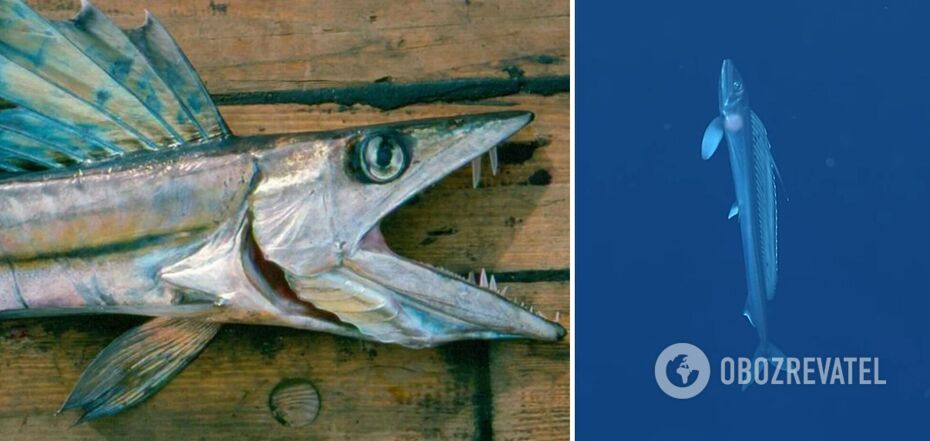Life
Strange cannibal fish from the depths of the sea committed suicide on the U.S. coast: scientists are baffled
On the west coast of the United States in early May several dead deep-sea fish with fangs and cannibalistic tendencies, which usually live in the so-called twilight zone of the ocean - at a depth of 200 to 1,000 meters, were found. Although this is not the first such case, scientists still cannot understand why healthy fish commit such suicide by throwing themselves ashore.
We are talking about a fish called the long-finned alepisaurus (Alepisaurus ferox). This fish is one of the most amazing creatures of the sea depths, with a prehistoric appearance that includes large eyes, a fang-like jaw, a fin like a sail, and a long, slippery, scaleless body.
The name of the genus Alepisaurus translates as "scaleless lizard.
According to the U.S. National Oceanic and Atmospheric Administration (NOAA), this fish can grow up to 3 meters in length, making it one of the largest deep-sea creatures.
According to Business Insider, this fish is found in oceans around the world and has a great appetite. It eats small fish, crustaceans, and octopuses, as well as members of its own species, for which NOAA called it the "proverbial cannibal."
Another interesting thing about the fish's appetite is that scientists have repeatedly found whole and undigested food in this fish's stomach. They believe that alepisaurids have an unusual digestive process that allows the fish to eat as much food as it can when it finds it, and store it for later to digest when needed.
Scientists claim that alepisaurids are hermaphrodites, meaning that they have male and female sex organs. Such conclusions were made with regard to young individuals, but scientists have no evidence that adult fish are capable of impregnating themselves.
Despite the fact that fish is quite common and well studied by biologists, one aspect of its behavior scientists still do not understand. So, every year there is a suicide of alepisaur in different parts of the world. Usually, the fish is found already dead on the coast with no apparent cause of death.
"No one knows why they go ashore," said the Oregon Department of Parks and Recreation, where the latest cases were found.
Elan Portner, a scientist at the Scripps Institution of Oceanography in San Diego, notes that these deep-sea fish have been washed ashore for "at least 300 years, possibly longer," but so far "no one knows why."
As Benjamin Frable, a fish expert at the Scripps Institute, suggests, the fish may accidentally swim too close to the shoreline in pursuit of prey and end up trapped.
Daniel Kamikawa, a fisheries research biologist at NOAA's Northwest Fisheries Science Center, said that although such suicides occur regularly, they are not widespread and therefore have been little researched by scientists.
According to him, there are three potential theories as to why cannibal fish are washed ashore. The first is that these fish are injured or sick, so they can't swim effectively and are pushed to shore (but this theory is contradicted by cases where fish were found on shore still alive and when they were returned to the water, they calmly swam away). The second theory is that the fish could have been thrown ashore by a storm. The third is related to a phenomenon known as temperature shock - when a fish suddenly enters water that is much colder than its normal temperature range.
"This causes the fish to go into shock, which can lead to significant loss of fitness and/or be fatal to the fish. But again, these are all unproven theories," Kamikawa said.
Earlier OBOZREVATEL also told about the fact that on the coast of Great Britain recently discovered a mysterious sea creature with a sharp tail.
Subscribe to the channels of OBOZREVATEL in Telegram and Viber to keep up with the latest developments.





























